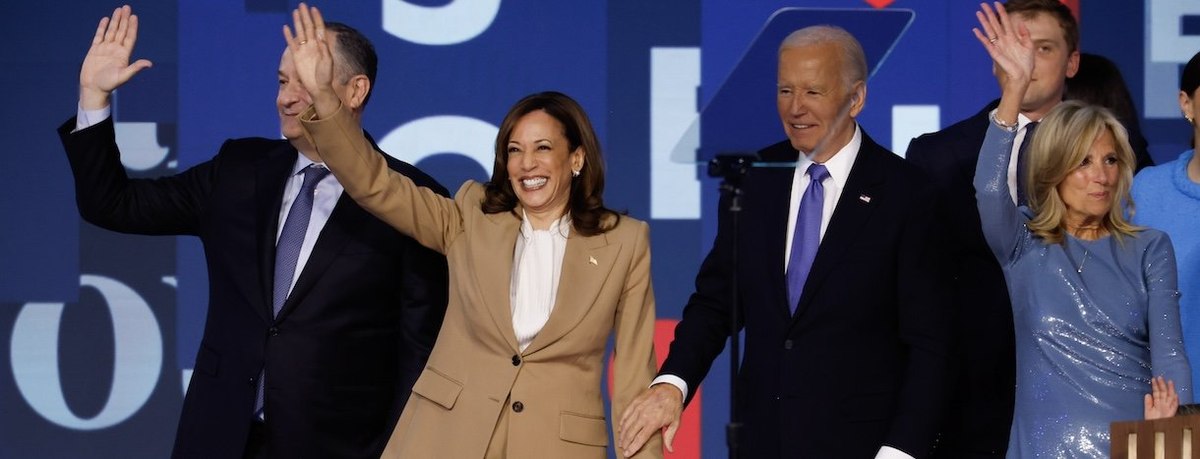This week’s Economist/YouGov poll covers the presidential election, candidates' presidential qualities, the running mates' presidential qualifications, the Democratic National Convention, inflation, and the wars in Ukraine and Gaza.
The 2024 Election
- Vice President Kamala Harris holds a 3-percentage-point lead over former President Donald Trump among registered voters in the poll, conducted mostly before the Democratic National Convention as well as during its first day — before her Thursday acceptance speech
- Harris consistently has held a small lead for the last few weeks
- 95% of both Harris and Trump supporters say their minds are made up: They will definitely vote for their preferred candidate
- Harris' lead among women who are registered voters is 13 points: 51% to 38%
- Trump has a 7-point lead among men who are registered voters
- 71% of Democrats and 61% of Republicans say they are extremely or very enthusiastic about voting for president this year — a reversal from Republicans' enthusiasm edge when Joe Biden was the Democratic candidate
Presidential candidate qualities
- More Americans are concerned about Trump's ability to handle international crises and temperament than are concerned about the equivalent qualities in Harris
- Concerns about Biden's age and perceived health that grew after the June presidential debate helped force Biden out of the presidential race, and 60% now say age and health are having a severe effect on his ability to do the job
- 35% say Trump’s age and health would have a severe impact on his ability to fulfill his duties as president if he were elected; only 8% say that about Harris
Vice presidents' qualifications
- Americans are slightly more likely to see Minnesota Governor Tim Walz as qualified to be president, if it becomes necessary, than to say that about Trump's running mate, Senator JD Vance
- Democrats and Republicans overwhelmingly say their party's candidate is qualified and the other's is not
- Opinions of Walz are mixed, with just about as many holding a very or somewhat favorable opinion of him as hold an unfavorable one
- More are unfavorable about Vance than are favorable
- Americans opinions of the running mates are like their opinions of the presidential candidates: Americans are closely divided about Harris while more are unfavorable than favorable toward Trump
The Democratic National Convention
- More Americans say the Democratic Party is very or somewhat united than say the Republican Party is
- 80% of Democrats believe their party is united, 11 points higher than the share of Republicans who believe their party is
- Former President Barack Obama and former First Lady Michelle Obama are the most popular of the political leaders addressing the Democratic National Convention this week whom we polled about: Majorities of Americans view each one favorably and among Democrats, 94% and 93%, respectively, view each one favorably
Inflation: beliefs vs. reality
- The poll studied how much Americans know about the inflation rate: 31% think the inflation rate is between 2% and 4% while most think it's at least 4%
- Last week, the Bureau of Labor Statistics reported that the inflation rate had dropped to 2.9%, the lowest rate since 2021
- 27% think the inflation rate is at least 10%
- More Americans think the inflation rate now is higher compared to six months ago, than say it's lower now
- More also think the rate will be lower in six months than it is now, than expect it to be lower
- Inflation is Americans' most important issue, by a large margin: 26% say inflation/prices is the most important issue for them, compared to 12% who name jobs and the economy
- 36% of Americans say the Republican Party has a more effective plan to reduce inflation, while 32% say the Democratic Party does
The Ukraine-Russia War
- Americans continue to overwhelmingly sympathize with Ukraine in its more than two-year fight with the invading Russian army; 63% sympathize more with Ukraine, 3% more with Russia, and 23% with neither
- Majorities of Americans think both Biden and Harris sympathize more with Ukraine, but Americans are likelier to say Trump sympathizes more with Russia than with Ukraine
- 67% of Democrats say Trump sympathizes more with Russia, 8% more with Ukraine; among Republicans, those figures are 10% and 38%
- After Ukraine's latest offensive, Americans are more likely to say Ukraine is currently winning (22%) than that Russia is (16%) — a change from the past six months, when Russia generally was more likely to be seen as having the upper hand
Americans are divided on whether military aid to Ukraine should be increased (25%), decreased (28%), or kept the same (27%)
The Israel-Hamas War
- Few Americans (18%) believe that a ceasefire in the Israel-Hamas conflict is very or somewhat likely in the next month; 55% say it not very likely or not likely at all
- 58% either say the current fight is fairly or very likely to lead to a wider war in the Middle East or think it already has done that; 45% say the same about a wider war in Europe as a result of the Ukraine-Russia war
- Americans are twice as likely to sympathize more with the Israelis than to sympathize more with the Palestinians in the war (35% vs. 17%); 25% say they sympathize with both equally
- More want to decrease military aid to Israel than to increase it (35% vs. 20%), while 25% would keep it at the current level
Throughout this report, some numbers may appear to be off by 1 because of rounding
— Carl Bialik and Taylor Orth contributed to this article
See the toplines and crosstabs for the August 17 - 20, 2024 Economist/YouGov Poll
Methodology: The poll was conducted among 1,565 U.S. adult citizens. Respondents were selected from YouGov’s opt-in panel to be representative of U.S. adult citizens. A random sample (stratified by gender, age, race, education, geographic region, and voter registration) was selected from the 2019 American Community Survey. The sample was weighted according to gender, age, race, education, 2020 election turnout and presidential vote, baseline party identification, and current voter registration status. Demographic weighting targets come from the 2019 American Community Survey. Baseline party identification is the respondent’s most recent answer given prior to November 1, 2022, and is weighted to the estimated distribution at that time (33% Democratic, 31% Republican). The margin of error for the overall sample is approximately 3%.
Image: Getty (Chip Somodevilla / Staff)
What do you think about the election, American politics in general, and everything else? Have your say, join the YouGov panel, and get paid to share your thoughts. Sign up here.
















